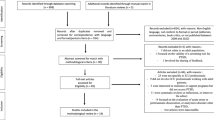Abstract
Crisis intervention has emerged over the last 50 years as a proven method for the provision of urgent psychological support in the wake of a critical incident or traumatic event. The history of crisis intervention is replete with singular, time-limited interventions. As crisis intervention has evolved, more sophisticated multicomponent crisis intervention systems have emerged. As they have appeared in the extant empirically-based literature, their results have proven promising. A previously published paper narratively reviewed the Critical Incident Stress Management (CISM) model of multicomponent crisis intervention. The purpose of this paper was to offer a statistical review of CISM as an integrated multicomponent crisis intervention system. Using the methodology of meta-analysis, a review of eight CISM investigations revealed a Cohen's d of 3.11. A fail-safe number of 792 was similarly obtained.
Similar content being viewed by others
REFERENCES
Cooper HM: Statistically combining independent studies: A metaanalysis of sex differences in conformity research. Journal of Personality and Social Psychology 37:131-135, 1979.
Everly GS, Flannery RB, Mitchell JT: Critical Incident Stress Management (CISM): A review of the literature. Aggression and Violent Behavior 5:23-40, 2000.
Everly GS, Mitchell JT: Critical Incident Stress Management: A New Era and Standard of Care in Crisis Intervention (2nd Ed.). Ellicott City, MD, Chevron, 1999.
Flannery RB: The Assaulted Staff Action Program. Ellicott City, MD, Chevron, 1998.
Mullen B: Advanced BASIC Meta-Analysis. Hillsdale, NJ, Erlbaum, 1989.
Glass GV: Primary, secondary and meta-analysis of research. Educational Research 5:3-8, 1976.
Flannery RB: Critical Incident Stress Management and the assaulted staff action program. International Journal of Emergency Mental Health 1:103-108, 1999a.
Flannery RB: Treating family survivors of mass casualties: A CISM family crisis intervention approach. International Journal of Emergency Mental Health 1:243-250, 1999b.
American Psychiatric Association: Treatments of Psychiatric Disorders.Washington, D.C., 1989.
Mitchell JT: When disaster strikes _ The Critical Incident Stress Debriefing process. Journal of Emergency Medical Services 8:36-39, 1983.
Bisson JI, Deahl M: Psychological debriefing and the prevention of posttraumatic stress: More research is needed. British Journal of Psychiatry 165:717-720, 1994.
Watts R: The efficacy of critical incident stress debriefing for personnel. Bulletin of the Australian Psychological Society 16:6-7, 1994.
Mitchell JT, Everly GS: Scientific evidence for CISM. Journal of Emergency Medical Services 22:87-93, 1997.
Robinson R, Mitchell J: Getting some balance back into the debriefing debate. Bulletin of the Australian Psychological Society 17:5-10, 1995.
Raphael B, Meldrum L, McFarlane A: Does debriefing after psychological trauma work? British Medical Journal 310:1479-1480, 1995.
Raphael B, Wilson J, Meldrum L, McFarlane: Acute preventive interventions. In: van der Kolk B et al., eds. Traumatic Stress NY, Guilford, 463-479, 1996.
Everly GS, Boyle S, Lating J: Effectiveness of psychological debriefing with vicarious trauma: A meta-analysis. Stress Medicine 15:229-233, 1999.
Everly GS, Boyle S: Critical Incident Stress debriefing (CISD): A meta-analysis. International Journal of Emergency Mental Health 1:165-168, 1999.
Everly GS, Piacentini A: Effects of CISD on stress and trauma symptoms: A meta-analysis. APA/NIOSH Work, Stress &; Health '99 Conference, Baltimore, 1999, March.
Flannery RB, Hanson MA, Penk W, Flannery GJ, Gallagher C: The Assaulted Staff Action Program: An approach to coping with the aftermath of violence in the workplace. In: Murphy L, Hurrell R, Sauter S, Keita G, eds. Job Stress Intervention. Washington, D.C., American Psychological Association, 189-212, 1995.
Busuttil W, Turnbull G, Neal L, Rollins J, West A, Blanch N, Herepath R: Incorporating psychological debriefing techniques within a brief group therapy programme for the treatment of posttraumatic stress disorder. British Journal of Psychiatry 167:495-502, 1995.
Flannery RB, Hanson MA, Penk W, Goldfinger S, Pastva G, Navon M: Replicated declines in assault rates after the implementation of the ASAP. Psychiatric Services 49:241-243, 1998.
Flannery RB, Penk W, Corrigan M: Assaulted Staff Action Program (ASAP) and declines in the prevalence of assaults: Community based replication. International Journal of Emergency Mental Health 1:19-22, 1999.
Richards D: A field study of CISD v. CISM. Paper presented to the Fifth World Congress on Stress, trauma and Coping in the Emergency Services Professions, Baltimore, 1999, April.
Mitchell JT, Schiller G, Eyler V, Everly G: Community crisis intervention: The Coldenham tragedy revisited. International Journal of Emergency Mental Health 1:227-236, 1999.
Flannery RB, Anderson E, Marks L, Uzoma L: The Assaulted Staff Action Program and declines in rates of assault: Mixed replicated findings. Psychiatric Quarterly 71:165-175, 2000.
Glass GZ: Integrating findings: The meta-analysis of research. In Shulman LS, ed.: Review of Research in Education. Vol. 5. Itasca, IL, Peacock Press, 1978.
Rosenthal R: Meta-Analytic Procedures for Social Research. London, Sage Publishers, 1991.
Cohen J: Statistical Power Analysis for the Behavioral Sciences. NY, Academic Press, 1977.
Rosenthal R: The “file drawer” problem and tolerance for null results. Psychological Bulletin 86:638-641, 1979.
Author information
Authors and Affiliations
Rights and permissions
About this article
Cite this article
Everly, G.S., Flannery, R.B. & Eyler, V.A. Critical Incident Stress Management (CISM): A Statistical Review of the Literature. Psychiatr Q 73, 171–182 (2002). https://doi.org/10.1023/A:1016068003615
Issue Date:
DOI: https://doi.org/10.1023/A:1016068003615




